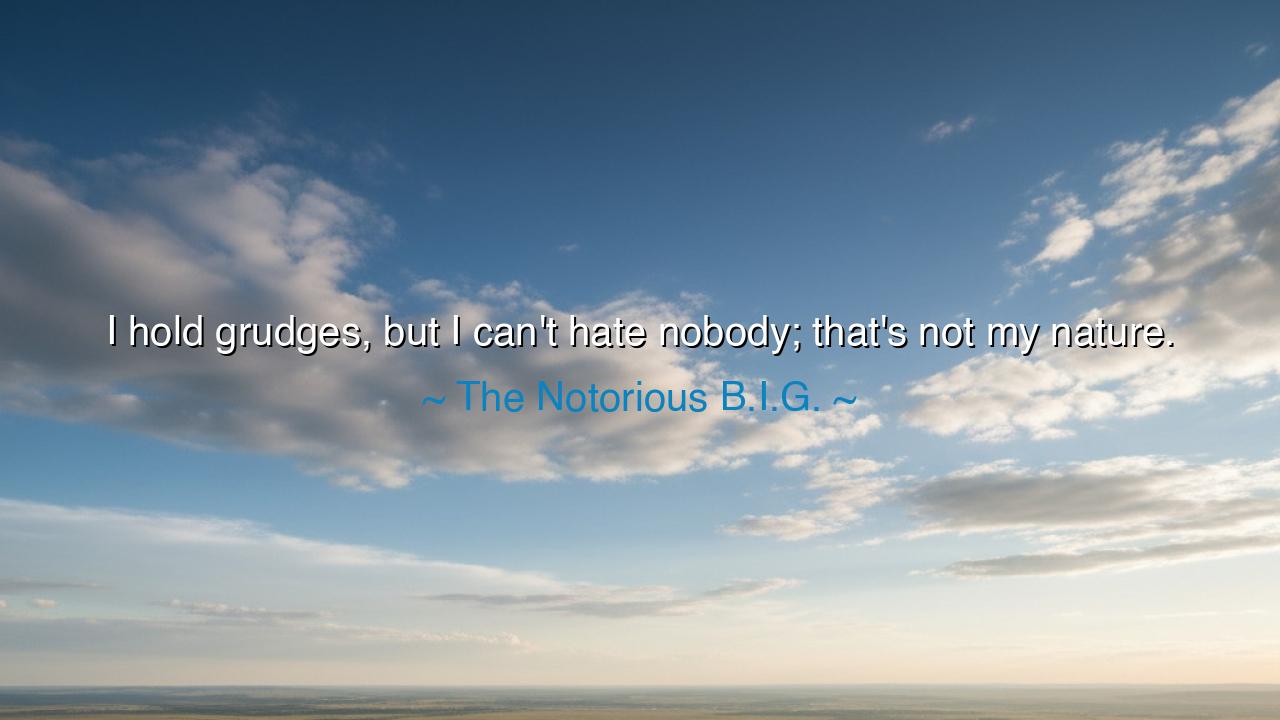
I hold grudges, but I can't hate nobody; that's not my nature.






The poet of the streets, The Notorious B.I.G., once declared: “I hold grudges, but I can’t hate nobody; that’s not my nature.” In this raw confession lies a wisdom deeper than it first appears, for it speaks to the eternal struggle of the human heart—to remember wrongs, to feel their sting, and yet to resist the consuming fire of hate. To hold grudges is to carry the memory of betrayal, to guard oneself from being wounded again. But to let hate take root is to poison the soul, to turn one’s nature against itself.
O listener, understand this truth: anger is natural, caution is wise, but hatred is ruin. A grudge can be the shield that reminds you of past harm, urging vigilance in the future. But hate is a sword turned inward, striking not the enemy but the one who wields it. In these words, Biggie reminds us that though he felt the pain of betrayal, he refused to allow it to consume his spirit. His nature, forged in hardship, was not to destroy but to endure, not to wither in bitterness but to stand firm with strength.
Consider, if you will, the life of Nelson Mandela. Imprisoned for twenty-seven years, robbed of freedom and time, he emerged not as a man consumed by hate, though he had every reason. Instead, he remembered the injustices—the grudges he bore—but he chose not to let them master his soul. He sought reconciliation, not revenge, and in so doing lifted a nation from the abyss. Mandela’s life stands as a shining example that one may carry memory of harm without surrendering to hatred.
There is wisdom also in knowing that nature itself plays a role. Each soul has its essence, its inner law. Biggie declared that his nature was not to hate—a reminder that every man must know himself. Some are quick to anger, others slow; some are inclined to forgive, others to remember. The noble task is not to deny one’s nature, but to refine it, so that even when wronged, the heart does not descend into darkness. To say, “I cannot hate,” is not weakness—it is mastery of self.
Yet, do not misunderstand: to refuse hate is not to embrace the betrayer. A grudge held may still serve as a boundary, a guard against false friendship or repeated harm. It is the memory that says, “I will not forget, and I will not be fooled again.” Such remembrance is not vengeance, but wisdom. It is the mark of those who learn from pain without becoming pain themselves.
The lesson, then, is this: allow yourself the honesty of hurt, but do not let it grow into hatred. Keep your heart vigilant, but unpoisoned. To forgive is noble, but to forget unwisely can be folly. Strike the balance, as Biggie did: carry your scars, but keep your soul uncorrupted. In this way, you guard your dignity without surrendering your peace.
Therefore, children of tomorrow, walk carefully with this wisdom. When wronged, do not rush to erase the wound, for memory teaches. But neither should you nurture hate, for it devours the vessel that contains it. Choose instead the middle path: firm in remembrance, soft in spirit, unwavering in strength. In this lies the secret of survival in a harsh world—the ability to endure betrayal without becoming a betrayer of your own soul.
And so remember: a grudge may shape your caution, but let no man or woman rob you of your true nature. To live without hate is to live in freedom, unchained by the darkness of others. In this way, you rise above the world’s cruelty, carrying wisdom without bitterness, strength without venom, and dignity without despair.






AAdministratorAdministrator
Welcome, honored guests. Please leave a comment, we will respond soon